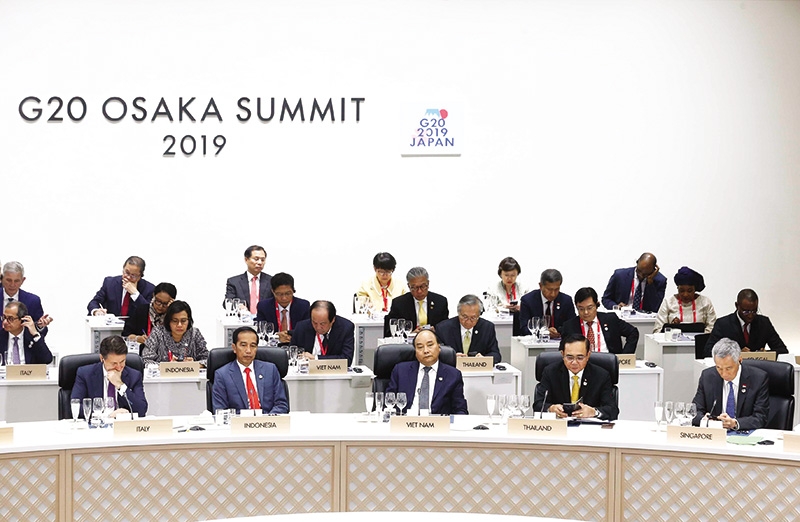G20 praises Vietnamese proposals
 |
| Prime Minister Nguyen Xuan Phuc (middle, first row) attended the G20 Osaka Summit 2019 |
At last week’s summit, Prime Minister Nguyen Xuan Phuc especially express interest in the area of innovation and the digital economy.
The section was focused on the global digitalisation process impacting all nations. Participants discussed the free movement of data, closely linked with reliability, addressing socio-economic issues in the context of Industry 4.0, as well as technological renovation such as e-commerce and information safety and security.
Vietnam proposed several initiatives, including building up a global network connecting innovation centres including centres with development of Artificial Intelligence, technological renovation, as well as data administration via digital technology. The proposals received a thumbs-up from the summit’s member states.
As digitalisation is transforming every aspect of all economies and societies, effective use of data is increasingly becoming an important driver of economic growth and social wellbeing. According to the prime minister, awareness for the digital age is a key component for the future growth of Vietnam. The digital economy will be a new driving force for the country to achieve the goal of rapid and sustainable growth.
At the recent Vietnam Economic Forum in Hanoi, PM Phuc said, “The digital economy of Vietnam is booming. Forecasts predict that this section of Vietnam’s economy will reach a value of $33 billion by 2025.”
With 70 per cent of mobile subscribers using 3G and 4G networks, and each person owning on average 1.7 smartphones, he believed the country could benefit hugely from the digital age.
Access to e-commerce sites via smartphones accounted for 72 per cent and online shopping conducted via smartphones made up for 53 per cent.
The impressive figures indicated that Vietnam could be confident of a successful transition to a digital economy, the prime minister added.
Under past presidencies, G20 discussions have focused on how innovation, including digitalisation, drives growth and enhances productivity, while also shedding light on the importance of its impact on the labour market, skills, and the digital divide.
Vu Hong Nam, Vietnamese Ambassador to Japan, said that Vietnam was one of eight nations invited by Japan to attend the G20 Summit.
“This shows Vietnam’s increased position in the world’s political climate and the country’s strongly-developing economy which can partly impact the wider global economy,” Nam said.
“The prime minister himself has been strongly pushing up development of the 4.0 economy in Vietnam, and the country has actively partaken in all activities of the digital economy topic at the summit,” he continued. “From there, Vietnam can become an indispensable member of the global digital economy in the future.”
According to Ousmane Dione, country director for the World Bank in Vietnam, the country will see the rise of the knowledge economy and automation as a megatrend.
“Workers today require a more complex skill set than their counterparts in the past,” Dione said. “This is being driven by automation, where machines are taking over manual and routine jobs, as well as an increase in demand for products driven by the expanding consumer class.”
For example, added Dione, there will be less demand for physical labourers such as loaders at shipping ports. Instead, workers with computer literacy and logistics skills will be needed to ensure that shipments are managed accurately and on time.
“However, a critical challenge in Vietnam is that only 8 per cent of the labour force has a university education, which is insufficient to leap into the knowledge economy. Ethnic minorities, older workers, and pockets of youth in Vietnam are particularly vulnerable to this,” Dione said. “While an economy that is more technology intensive has the potential to open up opportunities for better quality jobs, workers need to be equipped with the right skills to ride this wave.”
According to Dione, to avoid middle-income traps, experts contend that Vietnam will have to maintain a growth rate in the range of 7 to 7.5 per cent in the 2020s, higher than the average rate of 6.3 per cent of the last decade.
“We are living in an era of disruptive technologies that presents both challenges as well as opportunities – I would like to call it doi moi 4.0,” Dione said.
“To mitigate these risks and seize the opportunities, Vietnam needs to accelerate reforms that boost productivity and innovation as key drivers of growth in the coming decade, including steps to remove bottlenecks for private sector investments, enhance public sector institutions, and invest in 21st-century skills of the workforce,” he said.
What the stars mean:
★ Poor ★ ★ Promising ★★★ Good ★★★★ Very good ★★★★★ Exceptional
Related Contents
Latest News
More News
- Russian President congratulates Vietnamese Party leader during phone talks (January 25, 2026 | 09:58)
- Worldwide congratulations underscore confidence in Vietnam’s 14th Party Congress (January 23, 2026 | 09:02)
- Political parties, organisations, int’l friends send congratulations to 14th National Party Congress (January 22, 2026 | 09:33)
- 14th National Party Congress: Japanese media highlight Vietnam’s growth targets (January 21, 2026 | 09:46)
- 14th National Party Congress: Driving force for Vietnam to continue renewal, innovation, breakthroughs (January 21, 2026 | 09:42)
- Vietnam remains spiritual support for progressive forces: Colombian party leader (January 21, 2026 | 08:00)
- Int'l media provides large coverage of 14th National Party Congress's first working day (January 20, 2026 | 09:09)
- Vietnamese firms win top honours at ASEAN Digital Awards (January 16, 2026 | 16:45)
- ASEAN Digital Ministers' Meeting opens in Hanoi (January 15, 2026 | 15:33)
- ASEAN economies move up the global chip value chain (December 09, 2025 | 13:32)

 Tag:
Tag:




















 Mobile Version
Mobile Version